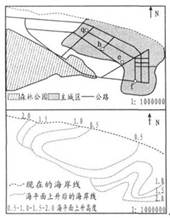问题
选择题
读某沿海城市城区分布图和预计海平面上升高度等值线图,回答问题。

小题1:图示城市主城区的面积为90平方千米,若海平面上升0.5米,该城市主城区被海水淹没的面积约达( )
A.10平方千米
B.30平方千米
C.50平方千米
D.90平方千米小题2:由图示信息可知,该城市主城区四个地点与最近海岸线之间的地面坡度最大的是 ( )
A.e地
B.f地
C.q地
D.h地
答案
小题1:C
小题2:B
题目分析:
小题1:如果海平面上升0.5米,那么数值为0.5米的等值线所包围的范围都会被淹没。比较淹没面积和城区面积,可以看出淹没面积大约是整个城区的1/2多,而城区面积为90平方米,因此答案C最为接近。
小题2:比较四个地点到海岸线之间,海平面上升高度等值线变化,其中f地变化最为明显,表明该处到最近海岸线之间的地面坡度最大。
点评:本题解题的关键能抓住图示信息,结合等值线的分布判断地图面积和地形坡度。
